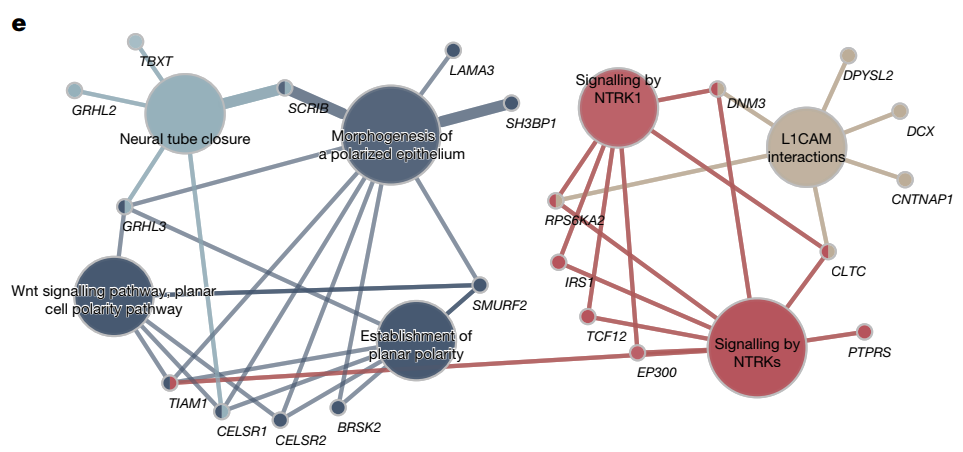[Published in Nature] Meningomyelocele Linked to De Novo Genetic Mutations, According to Landmark Study
- Mar 28, 2025
- 2 min read

Meningomyelocele (MM), the most common structural defect of the human central nervous system, is a severe congenital condition that typically requires surgical intervention shortly after birth. While environmental factors such as folic acid deficiency have been known to influence the risk, the exact genetic causes have long remained unclear.

A recent large-scale genomic study published in Nature has, for the first time, demonstrated a strong association between MM and de novo genetic mutations—those not present in either parent but arising spontaneously in the affected individual.
The international research effort, involving institutions from 15 countries—including the University of California, San Diego, Yonsei University College of Medicine, and the University of Texas at Austin—conducted whole-exome sequencing (WES) on 851 MM trios (affected child and both parents) and 732 control trios. The results revealed that approximately 22% of MM patients carried newly emerged mutations likely to disrupt gene function.
Strikingly, damaging mutations were identified in 187 genes, many of which are involved in pathways essential for neural tube closure. These include genes responsible for maintaining the cytoskeleton (actin and microtubule networks), Netrin-1 signaling, and chromatin-modifying enzymes.

The researchers further validated these findings in Xenopus (frog) embryos, where introducing the same mutations often led to incomplete neural tube closure—mirroring the pathology of MM. While some genes exerted their effects independently, others demonstrated a synergistic effect when mutated in combination, suggesting that MM may result from complex interactions between multiple genes and environmental factors.
![[Media cover] Dr. Junho Kim appeared in BRIC homepage](https://static.wixstatic.com/media/445be0_92e55fd8503243c0b39bd11e32b70c78~mv2.png/v1/fill/w_447,h_250,fp_0.50_0.50,q_35,blur_30,enc_avif,quality_auto/445be0_92e55fd8503243c0b39bd11e32b70c78~mv2.webp)
![[Media cover] Dr. Junho Kim appeared in BRIC homepage](https://static.wixstatic.com/media/445be0_92e55fd8503243c0b39bd11e32b70c78~mv2.png/v1/fill/w_220,h_123,fp_0.50_0.50,q_95,enc_avif,quality_auto/445be0_92e55fd8503243c0b39bd11e32b70c78~mv2.webp)
![[New paper] New model for calling low-level somatic mutations](https://static.wixstatic.com/media/445be0_98fe336b355d4de7969f74b807056e1d~mv2.png/v1/fill/w_447,h_250,fp_0.50_0.50,q_35,blur_30,enc_avif,quality_auto/445be0_98fe336b355d4de7969f74b807056e1d~mv2.webp)
![[New paper] New model for calling low-level somatic mutations](https://static.wixstatic.com/media/445be0_98fe336b355d4de7969f74b807056e1d~mv2.png/v1/fill/w_220,h_123,fp_0.50_0.50,q_95,enc_avif,quality_auto/445be0_98fe336b355d4de7969f74b807056e1d~mv2.webp)
![[Media cover] Gunho Lee appeared in BRIC page](https://static.wixstatic.com/media/445be0_1a9416d9f2214588bacba832eecf5c5e~mv2.png/v1/fill/w_447,h_250,fp_0.50_0.50,q_35,blur_30,enc_avif,quality_auto/445be0_1a9416d9f2214588bacba832eecf5c5e~mv2.webp)
![[Media cover] Gunho Lee appeared in BRIC page](https://static.wixstatic.com/media/445be0_1a9416d9f2214588bacba832eecf5c5e~mv2.png/v1/fill/w_220,h_123,fp_0.50_0.50,q_95,enc_avif,quality_auto/445be0_1a9416d9f2214588bacba832eecf5c5e~mv2.webp)
![[New paper] Genomic profiling of NK/T-cell lymphoma](https://static.wixstatic.com/media/445be0_2393315558cd46ecb2a8724c6b787630~mv2.png/v1/fill/w_447,h_250,fp_0.50_0.50,q_35,blur_30,enc_avif,quality_auto/445be0_2393315558cd46ecb2a8724c6b787630~mv2.webp)
![[New paper] Genomic profiling of NK/T-cell lymphoma](https://static.wixstatic.com/media/445be0_2393315558cd46ecb2a8724c6b787630~mv2.png/v1/fill/w_220,h_123,fp_0.50_0.50,q_95,enc_avif,quality_auto/445be0_2393315558cd46ecb2a8724c6b787630~mv2.webp)
![[Media cover] Sora Kim appeared in BRIC page](https://static.wixstatic.com/media/445be0_58ba27cbc95b401faf552faae11645f7~mv2.png/v1/fill/w_447,h_250,fp_0.50_0.50,q_35,blur_30,enc_avif,quality_auto/445be0_58ba27cbc95b401faf552faae11645f7~mv2.webp)
![[Media cover] Sora Kim appeared in BRIC page](https://static.wixstatic.com/media/445be0_58ba27cbc95b401faf552faae11645f7~mv2.png/v1/fill/w_220,h_123,fp_0.50_0.50,q_95,enc_avif,quality_auto/445be0_58ba27cbc95b401faf552faae11645f7~mv2.webp)
![[New paper] New method for neoantigen prediction](https://static.wixstatic.com/media/445be0_d3221d19f32d4cb596aa19c556bee186~mv2.png/v1/fill/w_447,h_250,fp_0.50_0.50,q_35,blur_30,enc_avif,quality_auto/445be0_d3221d19f32d4cb596aa19c556bee186~mv2.webp)
![[New paper] New method for neoantigen prediction](https://static.wixstatic.com/media/445be0_d3221d19f32d4cb596aa19c556bee186~mv2.png/v1/fill/w_220,h_123,fp_0.50_0.50,q_95,enc_avif,quality_auto/445be0_d3221d19f32d4cb596aa19c556bee186~mv2.webp)
![[New paper] ISOexpresso: a web-based platform for
isoform-level expression analysis in
human cancer](https://static.wixstatic.com/media/445be0_5824932ff2584587aba8ebca92397c38~mv2.webp)
![[New paper] identification of false somatic variants from recombinant vector contamination](https://static.wixstatic.com/media/445be0_3482fa16a0e842fc972d66f9a9647676~mv2.png/v1/fill/w_447,h_250,fp_0.50_0.50,q_35,blur_30,enc_avif,quality_auto/445be0_3482fa16a0e842fc972d66f9a9647676~mv2.webp)
![[New paper] identification of false somatic variants from recombinant vector contamination](https://static.wixstatic.com/media/445be0_3482fa16a0e842fc972d66f9a9647676~mv2.png/v1/fill/w_220,h_123,fp_0.50_0.50,q_95,enc_avif,quality_auto/445be0_3482fa16a0e842fc972d66f9a9647676~mv2.webp)
![[New paper] A review to transcriptome sequencing](https://static.wixstatic.com/media/445be0_7fb2d479192b497b990f393e8a07720d~mv2.jpg/v1/fill/w_447,h_250,fp_0.50_0.50,lg_1,q_30,blur_30,enc_avif,quality_auto/445be0_7fb2d479192b497b990f393e8a07720d~mv2.webp)
![[New paper] A review to transcriptome sequencing](https://static.wixstatic.com/media/445be0_7fb2d479192b497b990f393e8a07720d~mv2.jpg/v1/fill/w_220,h_123,fp_0.50_0.50,q_90,enc_avif,quality_auto/445be0_7fb2d479192b497b990f393e8a07720d~mv2.webp)
![[Research grant] Post-genome projects involved multiple ministries](https://static.wixstatic.com/media/445be0_15d22e7db0814c38b28c308ea8f434e3~mv2.jpg/v1/fill/w_356,h_199,fp_0.50_0.50,lg_1,q_30,blur_30,enc_avif,quality_auto/445be0_15d22e7db0814c38b28c308ea8f434e3~mv2.webp)
![[Research grant] Post-genome projects involved multiple ministries](https://static.wixstatic.com/media/445be0_15d22e7db0814c38b28c308ea8f434e3~mv2.jpg/v1/fill/w_220,h_123,fp_0.50_0.50,q_90,enc_avif,quality_auto/445be0_15d22e7db0814c38b28c308ea8f434e3~mv2.webp)
![[Award] Prof. Sangwoo Kim won the 5th Amgen-KAST Biotechnology Award from the Korean Academy of Science and Technology (KAST)](https://static.wixstatic.com/media/445be0_6a700e498873459eac095d6931050fac~mv2.jpg/v1/fill/w_440,h_250,fp_0.50_0.50,q_30,blur_30,enc_avif,quality_auto/445be0_6a700e498873459eac095d6931050fac~mv2.webp)
![[Award] Prof. Sangwoo Kim won the 5th Amgen-KAST Biotechnology Award from the Korean Academy of Science and Technology (KAST)](https://static.wixstatic.com/media/445be0_6a700e498873459eac095d6931050fac~mv2.jpg/v1/fill/w_74,h_42,fp_0.50_0.50,q_90,enc_avif,quality_auto/445be0_6a700e498873459eac095d6931050fac~mv2.webp)
![[Award] Taehyeon Kim won BIOINFO 2025 Excellent Poster Award from the Korean Society for Bioinformatics (KSBI)](https://static.wixstatic.com/media/445be0_d28d626f4324465c9e9a51a67131f94a~mv2.jpg/v1/fill/w_250,h_250,fp_0.50_0.50,q_30,blur_30,enc_avif,quality_auto/445be0_d28d626f4324465c9e9a51a67131f94a~mv2.webp)
![[Award] Taehyeon Kim won BIOINFO 2025 Excellent Poster Award from the Korean Society for Bioinformatics (KSBI)](https://static.wixstatic.com/media/445be0_d28d626f4324465c9e9a51a67131f94a~mv2.jpg/v1/fill/w_74,h_74,fp_0.50_0.50,q_90,enc_avif,quality_auto/445be0_d28d626f4324465c9e9a51a67131f94a~mv2.webp)
![[News] Celebrating Our Alumna: Dr. Yoo-Jin Ha Joins Hanyang University as a Professor](https://static.wixstatic.com/media/445be0_f9868047493140be95e8d6d45b574425~mv2.png/v1/fill/w_285,h_250,fp_0.50_0.50,q_35,blur_30,enc_avif,quality_auto/445be0_f9868047493140be95e8d6d45b574425~mv2.webp)
![[News] Celebrating Our Alumna: Dr. Yoo-Jin Ha Joins Hanyang University as a Professor](https://static.wixstatic.com/media/445be0_f9868047493140be95e8d6d45b574425~mv2.png/v1/fill/w_74,h_65,fp_0.50_0.50,q_95,enc_avif,quality_auto/445be0_f9868047493140be95e8d6d45b574425~mv2.webp)
![[Award] Ahyeon Kim won the Research Support Scholarship from the Health Fellowship Foundation (HFF)](https://static.wixstatic.com/media/445be0_eed364dcfe4047dfa6644808d046c2bb~mv2.png/v1/fill/w_171,h_224,fp_0.50_0.50,lg_1,q_35,blur_30,enc_avif,quality_auto/445be0_eed364dcfe4047dfa6644808d046c2bb~mv2.webp)
![[Award] Ahyeon Kim won the Research Support Scholarship from the Health Fellowship Foundation (HFF)](https://static.wixstatic.com/media/445be0_eed364dcfe4047dfa6644808d046c2bb~mv2.png/v1/fill/w_74,h_97,fp_0.50_0.50,q_95,enc_avif,quality_auto/445be0_eed364dcfe4047dfa6644808d046c2bb~mv2.webp)
![[Media cover] Taek Chung’s research covered in media](https://static.wixstatic.com/media/445be0_e2366087f3ee42dbb47a742af6016908~mv2.png/v1/fill/w_440,h_250,fp_0.50_0.50,q_35,blur_30,enc_avif,quality_auto/445be0_e2366087f3ee42dbb47a742af6016908~mv2.webp)
![[Media cover] Taek Chung’s research covered in media](https://static.wixstatic.com/media/445be0_e2366087f3ee42dbb47a742af6016908~mv2.png/v1/fill/w_74,h_42,fp_0.50_0.50,q_95,enc_avif,quality_auto/445be0_e2366087f3ee42dbb47a742af6016908~mv2.webp)
![[New paper] Carcinogenic sequence uncovered at the genomic and transcriptomic levels in biliary tract cancer](https://static.wixstatic.com/media/445be0_71f38d7e682142adb88dfc5102a6c73d~mv2.png/v1/fill/w_440,h_250,fp_0.50_0.50,lg_1,q_35,blur_30,enc_avif,quality_auto/445be0_71f38d7e682142adb88dfc5102a6c73d~mv2.webp)
![[New paper] Carcinogenic sequence uncovered at the genomic and transcriptomic levels in biliary tract cancer](https://static.wixstatic.com/media/445be0_71f38d7e682142adb88dfc5102a6c73d~mv2.png/v1/fill/w_74,h_42,fp_0.50_0.50,q_95,enc_avif,quality_auto/445be0_71f38d7e682142adb88dfc5102a6c73d~mv2.webp)
![[Published in Nature] Meningomyelocele Linked to De Novo Genetic Mutations, According to Landmark Study](https://static.wixstatic.com/media/445be0_20fa3d5737964fdcbf6a1f0a0dc2eceb~mv2.png/v1/fill/w_440,h_250,fp_0.50_0.50,q_35,blur_30,enc_avif,quality_auto/445be0_20fa3d5737964fdcbf6a1f0a0dc2eceb~mv2.webp)
![[Published in Nature] Meningomyelocele Linked to De Novo Genetic Mutations, According to Landmark Study](https://static.wixstatic.com/media/445be0_20fa3d5737964fdcbf6a1f0a0dc2eceb~mv2.png/v1/fill/w_74,h_42,fp_0.50_0.50,q_95,enc_avif,quality_auto/445be0_20fa3d5737964fdcbf6a1f0a0dc2eceb~mv2.webp)
![[New paper] Reversion of BRCA1 L1780P mutation confers resistance to PARP and ATM inhibitors in breast cancer](https://static.wixstatic.com/media/445be0_c80a6fb2c75e474a80d7882264800d60~mv2.png/v1/fill/w_250,h_250,fp_0.50_0.50,q_35,blur_30,enc_avif,quality_auto/445be0_c80a6fb2c75e474a80d7882264800d60~mv2.webp)
![[New paper] Reversion of BRCA1 L1780P mutation confers resistance to PARP and ATM inhibitors in breast cancer](https://static.wixstatic.com/media/445be0_c80a6fb2c75e474a80d7882264800d60~mv2.png/v1/fill/w_74,h_74,fp_0.50_0.50,q_95,enc_avif,quality_auto/445be0_c80a6fb2c75e474a80d7882264800d60~mv2.webp)
![[Award] Yoo-Jin Ha awarded The 14th Dissertation of the Year Award (Biological Science) from the Korean Academy of Science and Technology, funded by The S-OIL Science and Culture](https://static.wixstatic.com/media/445be0_c83776be76b64949bae81e77ed5433de~mv2.png/v1/fill/w_385,h_250,fp_0.50_0.50,q_35,blur_30,enc_avif,quality_auto/445be0_c83776be76b64949bae81e77ed5433de~mv2.webp)
![[Award] Yoo-Jin Ha awarded The 14th Dissertation of the Year Award (Biological Science) from the Korean Academy of Science and Technology, funded by The S-OIL Science and Culture](https://static.wixstatic.com/media/445be0_c83776be76b64949bae81e77ed5433de~mv2.png/v1/fill/w_74,h_48,fp_0.50_0.50,q_95,enc_avif,quality_auto/445be0_c83776be76b64949bae81e77ed5433de~mv2.webp)
![[Award] Jeongsoo Won won best poster award in BIOINFO 2024](https://static.wixstatic.com/media/445be0_c70a449b1e73476fb55ac9955da13682~mv2.jpg/v1/fill/w_250,h_250,fp_0.50_0.50,q_30,blur_30,enc_avif,quality_auto/445be0_c70a449b1e73476fb55ac9955da13682~mv2.webp)
![[Award] Jeongsoo Won won best poster award in BIOINFO 2024](https://static.wixstatic.com/media/445be0_c70a449b1e73476fb55ac9955da13682~mv2.jpg/v1/fill/w_74,h_74,fp_0.50_0.50,q_90,enc_avif,quality_auto/445be0_c70a449b1e73476fb55ac9955da13682~mv2.webp)
Comments